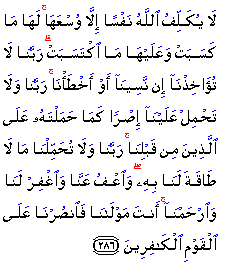Prayer of the Righteous, Gates of Goodness, Ramadan in History
Issue 299 » November 5, 2004 - Ramadan 22, 1425
General
| Living the Quran |
Al-Baqara (The
Cow)
Allah does not place upon anyone an unbearable burden. This demonstrates Allah's kindness, compassion and generosity towards His creation. Although Allah will question His servants and judge them, He will only punish for what one is able to protect himself from. As for what one cannot protect himself from, such as what one says to himself, or passing thoughts, one will not be punished for that. It should be stated here that to dislike the evil thoughts that cross one's mind is a part of faith. If we perform good deeds, then we will be rewarded and if we perform bad deeds, then we will be punished. In this verse, Allah has also directed the believers to supplicate to Him. He has promised that He will answer the believers' supplication. When we supplicate to Him as mentioned:
Source: |
| Understanding the Prophet's Life |
| Gates of Goodness On the Authority of Muaadh Ibn Jamal (may Allah be pleased with him) the Prophet, peace be upon him, said, "Shall I not inform you of the gates of goodness? [They are] fasting [which] is a shield, charity [which] extenguishes the sins like water extinguishes a fire and the prayer of a man in the depths of the night." [Recorded by al-Tirmidhi] In this hadith, the Prophet (peace be upon him) has called fasting a shield, like the shield that one uses in the battlefield. The shield protects a person from the enemy and fasting protects a person from committing sins and from entering the Hell-fire. Ibn Rajab points out that fasting is a shield only if the act of fasting is not harmed by foul or improper speech. Then Ibn Rajab makes the point that if fasting is not a shield from committing sins in this world, it will not be a shield from the Hell-fire in the next. Al-Baitaar points out that the word for shield is in the indefinite. This implies that it can be every type of shield. It is a shield from the Hell-fire, from Allah's anger, from disease in this world, from straying from the Straight Path, from becoming arrogant and so forth. The reference here is to voluntary charity not the obligatory zakat. Furthermore, the sins referred to here are the minor sins that are between a human and Allah. The major sins are not included here nor are the acts of wrong done toward others. The major sins are not extinguished by charity but are in need of repentance. Wrong done toward others need their forgiveness. The word jauf when used along with the word night means the middle of the night. That is the case here. There are many aspects that make the late-night prayer special. First and foremost, it is a prayer. The best action or matter is prayer. Second, the prayer said in the late-night is more virtuous than the voluntary prayers during the day because it is further from ostentation and being done for show. Furthermore, it is easy to have the fear of Allah and concentrate on the prayer in the late-night prayer as there are few disturbances at that time. It increases one's sincerity to Allah. Source: |
| Blindspot |
Ramadan in HistoryRamadan is a time of increased activity wherein the believers, lightened of the burden of constant eating and drinking, should become more willing to strive and struggle for Allah. The Prophet, peace be upon him, passed through approximately nine Ramadans after the Hijrah (Migration to Madina). They were filled with decisive events and left us with a shining example of sacrifice and submission to Allah. The month of Ramadan in the time of the Prophet was a time of purification, enjoining good, forbidding evil and striving hard with one's life and wealth. After the death of the Prophet, Muslims carried on this tradition and Allah used the true believers to affect the course of history. Ramadan continued to be a time of great trials and crucial events. Following are some of the important battles and events that have taken place in Ramadan: 2 A.H. (After Hijra) - The Prophet and his companions defeat the Makkans in the Battle of Badr. 8 A.H. - Makkah is conquered by the Prophet without a battle. 9 A.H. - The hypocrites of Madina hoping to oppose the unity of the Muslims have built their own Masjid (called Masjid Ad-Dirar). The Prophet has this Masjid destroyed. 92 A.H. - In Spain, the Muslim army led by Tariq ibn Ziyad confront the Visigoth army led by King Roderic. (The Muslims win this battle within a few days.) 582 A.H. - Salahuddin Al Ayyubi after battling with the Crusaders for years, finally drives them out of Syria and the whole of their occupied lands. 658 A.H. - The Muslim army led by Saifuddin Qutuz defeat the Mongol army at Ain Jalut. Sources: |
